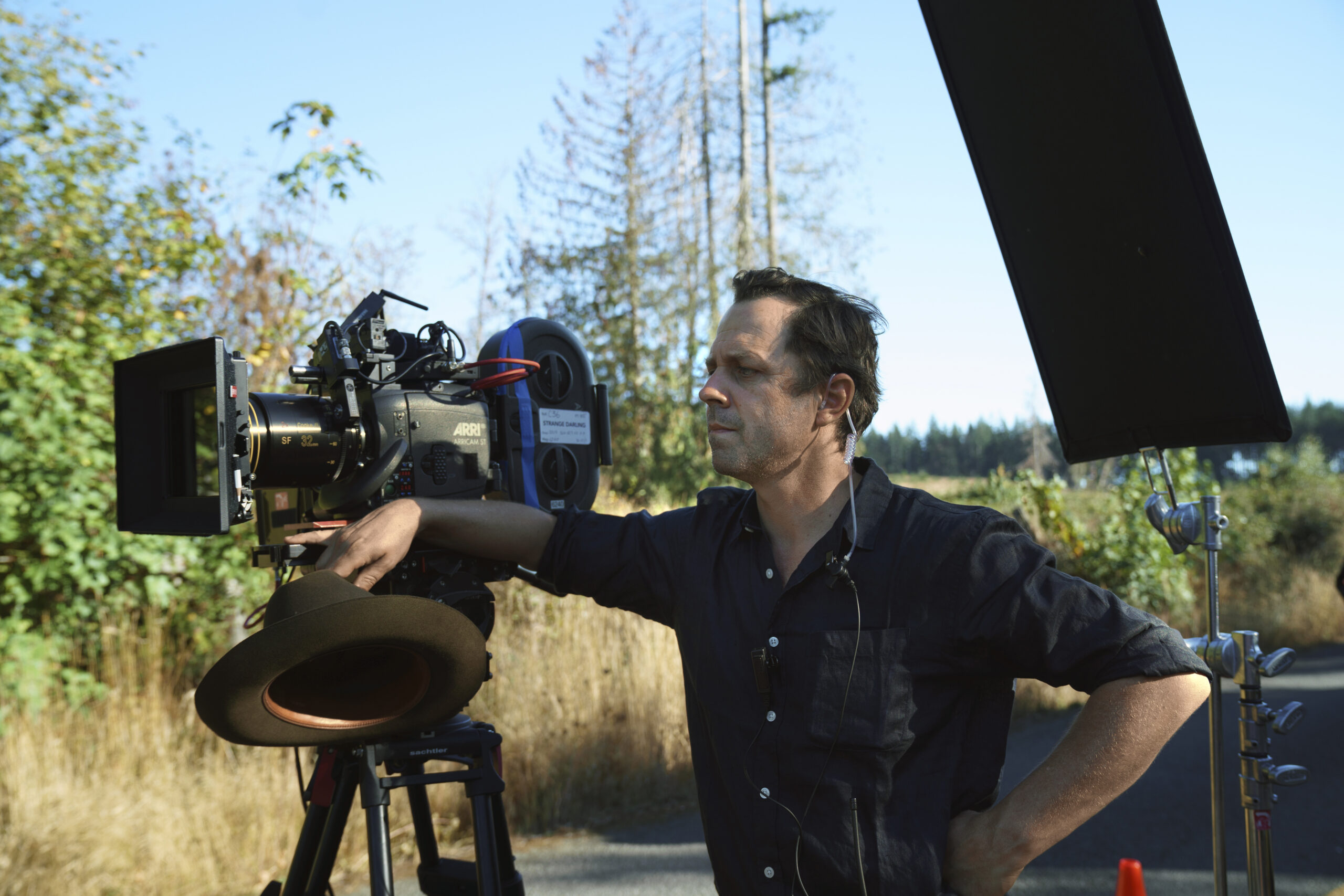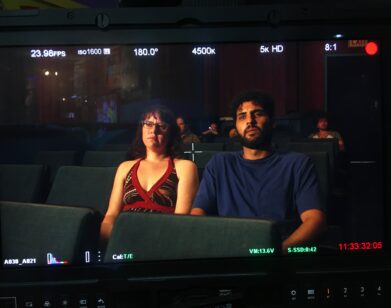IN CONVERSATION
Giovanni Ribisi Tells Josh Brolin How a Midlife Crisis Led Him to Cinematography
According to Josh Brolin, there are two kinds of midlife crises: “you can recede from life, or you can really punk it out and just get wily.” His old friend Giovanni Ribisi did the latter when he decided to “come out of the closet with cinematography,” as he put it to Brolin, and shoot his maiden feature Strange Darling, the cunning JT Mollner-directed thriller about a serial killer (played by Kyle Gallner) and the woman he meets at the tail end of a vicious murder spree. The film, shot entirely on a 35mm camera, is told in six non-linear chapters, and Ribisi’s choices as it concerns both framing and light make no small contribution to its stylish, menacing appeal. “It doesn’t feel like an affectation,” Brolin told Ribisi when the two met up on Zoom last week just a day before the film’s release. “It feels like an emotional addition to what’s going on in the scene.” And what did it take for Ribisi to finally pursue his dream of shooting a feature film? A good old midlife crisis. Below, he and Brolin discuss activating “fuck it” mode, making movies in the age of streaming, and their 1999 box office bomb, The Mod Squad.
———
GIOVANNI RIBISI: I’m so grateful that you’re doing this, Josh.
JOSH BROLIN: Oh, dude. I’m so happy to be doing it.
RIBISI: I’m so nervous.
BROLIN: I don’t care about being nervous anymore. And I think it’s a good segue into what this is. It makes perfect sense to me because of how I’ve known you. I’ve known you in two ways. One is how much you personally lend yourself to the profession as an actor, to the point where literally it scared me.
RIBISI: As I finally come out of the closet with cinematography and shooting things and wanting to do that professionally, it’s really all couched under the marquee banner of midlife crisis, including this interview.
BROLIN: Totally.
RIBISI: I think there’s two versions of midlife crises where you can just recede from life, or you can really punk it out and just get wily. I prefer the latter, and I know you do too.
BROLIN: I think that people misinterpret “fuck it” mode as irresponsible and chaotic and it’s quite the opposite. It’s the liberation of, “I’m really getting to this point in my life where the feedback matters less.” It’s nice to get praise, but you don’t develop arrogance. And then if you get slammed, you don’t take it so personally that you end up folding. So it made sense to me, given our talks for 20 years about architecture and interior design, about photography and all that, that you would do something like this. It’s like me writing a book and you doing cinematography. It makes perfect sense because we’re not going to go out and buy a Porsche; we’re going to fuck it up more and try to get more personal with life and say, “Can I pull more nectar out? Can I get closer to the essence of something?” So, let me just say that when I saw the movie—
RIBISI: You saw it?
BROLIN: Of course I did, man. I saw it right away. It’s presented in a way where I go, “Oh, cute.” You know what I mean? I was sucked in with a fishing pole and bait. There’s every setup to be able to write it off. And then you get into the film. And listen, I don’t get particularly jealous when somebody does a great role. I don’t go, “Oh, I should have done that.” So by the time I got to the end of the film, I was so fucking blown away. I was so manipulated, but I was so happy to be manipulated. The non-linear thing didn’t feel like an affectation at all. It felt so necessary. I thought the performances were great. My daughter’s on tour musically right now, and I had just seen your film, and I was in the Uber going from the airport to the venue, and suddenly we were bathed in this blue light and I was like, “Giovanni.” But that doesn’t feel like an affectation. It feels like an emotional addition to what’s going on in the scene. That’s no bullshit. When they were in the car with the blue light, I was more engaged with what was going on. What an interesting choice.
RIBISI: I’m blown away right now. I think a lot of that was based on the discussions that the director, writer, and I had. His name is J.T. Mollner. We had a four or five month pre-production, just him and myself in this room watching movies, discussing ideas, and making the movie on paper before we actually went and made it. We typed out an 83-page shot list document. We couldn’t afford a storyboard artist. And all of that was in large part having to do with what you just said, which is that we don’t give a fuck. And once we got on that MO, it became almost what can we do that’s wrong? What we are seeing out there in the ocean of content with streamers is people shooting tertiary colors, and it’s all about the bouquet of the lens and pastels and handheld. I mean, you have 18 days to shoot a feature nowadays. And we wanted to do the exact opposite. There’s a fine line of avoiding being distracting with a creative choice. And to the director’s credit, he was all about it. He wanted to dive into that. And nine times out of 10, you’ll fall flat on your fucking ass, right? But it’s also incredible how many people try to convince you not to do that, you know what I mean? We got shut down twice on this movie. And to the studio’s credit, they ultimately gave the picture over to the director. They ate humble pie. But they were very uncomfortable with a lot of choices. It wasn’t a technical thing. So up until about six months ago, we thought we had completely failed. So yeah, I don’t know where I was going with that, but it was just sort of an interesting contrast.
BROLIN: Well, the majority of the content that you see has no viscera whatsoever. You’re not taken in, you’re not manipulated, it’s not interactive, you don’t feel a part of it, you’re not cringing, you’re not guffawing. So you go, “Why is there so much content out there and yet, if you try to do something differently, you have an algorithm of people that are in charge of these algorithms that say, no, no, no, no, no?” You think people want that, but they don’t. They want to be surprised. No Country For Old Men is a great example. The end of No Country isn’t perfectly tied in a Hollywood bow. It was true to the book. I got pulled over by a cop once and he goes, “Hey, aren’t you the guy from that movie? I hated that ending.” I’ve heard it so many times. And I go, “How many times did you see it?” And he said, “Three.” And that’s the thing—they think they hate it, but their spirit is going, “Yes, yes, yes.” I know it’s become a cliche, but the Sam Beckett quote, “Ever tried. Ever failed. No matter. Try again. Fail again. Fail better.”
RIBISI: Wait, did you just pull that out of your brain? How did that happen?
BROLIN: No, but I know the quote.
RIBISI: That’s amazing.
BROLIN: It’s like what Miles Davis said: “You can’t find the right until you experience the wrong.” You have to be okay with falling, you have to be okay with skinning your knee, you have to be okay with humiliation and the possibility of a studio shutting you down. And I’m not kidding, man. I know this is an interview, and it’s supposed to be positive and help sell your movie, but I’m so frustrated with content right now. But when I watched your movie I went, “Thank you, God There’s still people out there making movies.” There was a movie back in the day and it had this vibe. It was overly saturated. And it was called Maniac, from 1980, a horror movie. And it’s a fucking great movie, a movie that never left me. I don’t remember story-wise what happened, but I remember IT visually. It reminded me of maybe one of the greatest movies I’ve ever seen, and that’s the original The Vanishing.
RIBISI: Unbelievable. Both had remakes by the way, but the original—
BROLIN: Both had horrendous remakes. I would say that to the face of anybody involved. They were horrible.
RIBISI: How dare you?
BROLIN: How dare you? But there was a sense that you were influenced [by it], but it was also totally original.
RIBISI: Wow. Holy shit, man. Thank you.
BROLIN: No, it’s true.
RIBISI: We talked a lot about The Vanishing. It’s a masterpiece.
BROLIN: It really is.
RIBISI: I forgot what I was going to say. Oh, now I remember. It’s interesting, because the algorithm is not a metaphor. I mean, we are talking about algorithms that are dictating human taste and behavior and what we’re producing as a nation and as a society. This is what guides us. But what’s interesting as well, and I really bring this up from a creative perspective, is that we feel like we have to spend $150 million on thrillers. We have gotten so bloated with budgets. I’m all for people making money, but it’s not just that it’s red tape. A friend of mine is making a movie for a hundred thousand dollars and he decided to become a signatory for SAG. He had to give $17,000 of that to SAG. And hey, I love residuals, I love insurance, I love fair wages and all of that. But there’s no point of entry for this younger generation. And that affects filmmaking as a whole, because there’s so much content and all these massive companies making the content. But at a certain point, this is where I tell my friends who are making these movies, “Fuck it, go get arrested.”
BROLIN: Yeah, literally.
RIBISI: I mean, go make your movie. Would Charlie Chaplin have been Charlie Chaplin or Buster Keaton or any of those guys if they weren’t allowed to just grab a camera?
BROLIN: Totally., I mean, the whole thing is set up to kind of dehydrate innovation.
RIBISI: Dude, that’s right. That’s it.
BROLIN: It’s a very greedy system right now. And you go, “Look, I don’t want to work unless I know that I’m going to make money.” You know what I mean? When I first started watching movies—and I’m watching Antonin Artaud in Napoléon, or I’m watching [Luis] Buñuel—those were the things that truly inspired me. And I think that’s coming back because things have gotten so out of control. You made a decision. You went, “You know what? I want to be a cinematographer now.” And I’m going, “Look at him go, man. He’s just freaking on this shit.” I’ve heard from other people about you innovating a lens. And it reminded me of what [Stanley] Kubrick did in The Shining. It was him who I believe innovated, or at least was part of innovating, the steady cam in order to get that big wheel going, right?
RIBISI: Well, there’s a lot on the horizon. I am so excited about this project. But I am not an optical engineer. You can have ideas for certain things and then the other smarty pants go and they do the math on it, right? But there’s a format. It all circumambulates around reviving a format that from the early 50s was called VistaVision. I’m sure you’re familiar with VistaVision, Paramount, Alfred Hitchcock and all those amazing movies. But beyond that, there’s offshoot formats when you start manipulating lenses and doing certain things without getting too technical. So yes, I’ll send you pictures. People are seeing the difference and appreciate it. But there hasn’t been a real innovation. I mean, the last 35 millimeter camera that was built, the one that people really use, almost 25 years ago.
BROLIN: Wow.
RIBISI: So the machines are starting to break down. And if you’re in this world, you start to go, “Shit, there goes another one.” So we need new cameras. Otherwise, at a certain point, the Kodak motion picture film division won’t have a machine to put their product in. I got really into VistaVision several years ago. I bought a camera. I hounded this one guy for months, and then I ultimately showed up with a bag full of money, like a back-alley drug deal. He opened his trunk and I gave him the money and I took the camera and it was fine. And then that happened to be the camera that people are now taking an interest in.
BROLIN: You have a visceral, cellular interest in this shit, and it’s so exciting to me. It’s an obsession.
RIBISI: I tell my wife this. I say, “You’ve got to know one thing about me before you start dating this guy, right? My house is always on fire, and that’s not a good thing.” I am a desperate Sicilian farmer. Okay? That’s who I am.
BROLIN: I mean, it’s not often that someone describes themselves that way, but from an outsider point of view, that’s what it is.
RIBISI: So there’s interest, but there’s also like, “Holy shit, midlife crisis.” Anyway…
BROLIN: All of this stuff could easily feel like an affectation, and it doesn’t. It feels seamlessly incorporated into the story because the story wins, always. You and I, being in our fifties, we’re not as bogged down by what the algorithm demands and not as reactive to it. We just don’t listen so well. And thank god for people like you that are giving hope to this business that is run by so much greed. I don’t know how many people have seen your film, but I saw that it had a 97% on the Rotten Tomatoes thin. That sounds so dumb when you say it, but you can judge a consensus by that.
RIBISI: I wish they didn’t call it a Tomatometer.
BROLIN: I know, right? But at least you have a red tomato and not a green splotch. We did a movie together that I think is one of the lowest-rated films of all time. I think it’s molding at this point. The Mod Squad is molding.
RIBISI: Oh, I forgot about that. Jesus.
BROLIN: You purposefully forgot about that.
RIBISI: When are you going to be directing a feature film?
BROLIN: I wrote a play, so I’m focused on that right now.
RIBISI: Holy shit.
BROLIN: We did a reading of it in Los Angeles down in Venice Beach. Patricia Arquette was the mother. It’s very mother-heavy. Patricia killed it, people saw it.
RIBISI: That is fucking awesome.
BROLIN: It’s fun. It’s like all these meaningless interests that I’ve had my whole life were suddenly able to be funneled into one place. You’re like, “I’ve got something that mirrors my obsession with the human condition.” And if somebody else can be affected by that, great. Is there any reason to do it? No. Is there any reason for me to write a book? No. All the stories exist already. But that’s why I was so blown away by this movie. I’m so glad you did it, man.
RIBISI: Thank you, man. That means the world.
BROLIN: Love you, Giovanni.
RIBISI: You too, man.







